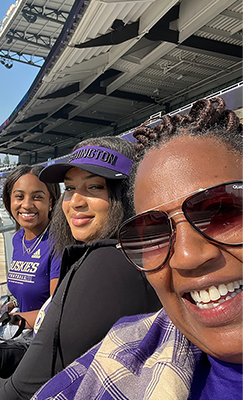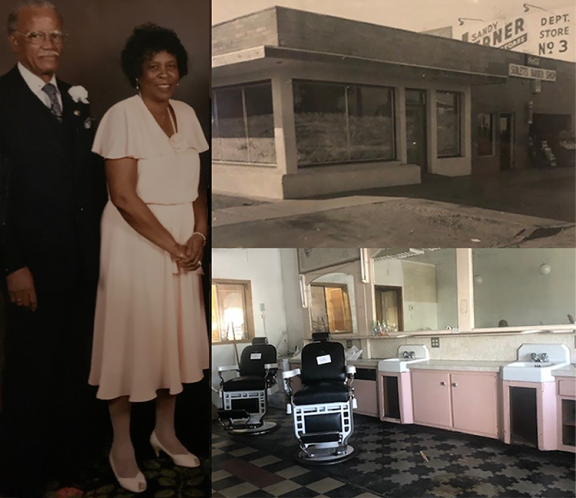By Natalie Hester, Co-President, External Affairs
When I think about my “education story” it is impossible for me to think just about my own K-12 and higher education years. As a mother raising two brilliant daughters in South Seattle – a joyful, culturally rich community that is chronically overlooked and systemically under-resourced—my “education story” spans not only my childhood, but also theirs. It is a path that I continue to trudge, arm in arm with my neighbors and parents from across the state, as a public school parent and Global Majority community advocate.

Growing up in Arizona, I recall my mom would hang on to all my schoolwork. At the end of the grading period, when my grade wouldn’t match my work, she would take my work back to the teacher. If my mom wasn’t constantly “on top of it”, the teacher would have excuses. I’m grateful that she was paying attention. I didn’t think that thirty years later, I would have to do the same for my children, but the need for this type of vigilance still exists for Black, Brown, and Indigenous families in our systems. Thus, I have tried to do the same for my own kids.
Before my daughters entered a new school or system, I’d attend PTA meetings to get a read on what the culture was like. Every single year, I would schedule a meeting two or three weeks into the school year to educate teachers about who my daughters are and what they need in order to be successful. My mom used to do that for me – she would tell them I was talkative, funny and liked to ask questions. I wanted to do the same for my kids.
Everybody doesn’t have the time to do that. I’m grateful, but many Global Majority parents and caregivers don’t have that privilege. Sadly, unless you are watching and paying attention, systemic racism will harm your children. And even if you are “on top of it,” negative things still may happen. That’s life as a Black family in every system, education, the healthcare system, criminal justice. As a Black person, it is being constantly vigilant and prepared for discrimination and braced for trauma every time you go into a store, the doctor’s office, anywhere.
As Global Majority parents, we often feel desperation when it comes to thinking about our children’s education. Why can’t we be in a space where our children understood for who they are, happy, loved, nurtured, learning with people who understand their brilliance AND get the resources and quality learning environments on par with public school students in other neighborhoods? It’s like we can’t have both. To constantly be on the hunt for what other kids experience just feels terrible. Organizing with my neighbors and community, creating a choice for ourselves and our families was something we didn’t know we were doing – it was just a priority for all of us.
Entering the Charter Public School Space
When my oldest daughter was in eighth grade, a teacher in our assigned district school told me that my daughter’s chances of attending college were diminished because she hadn’t yet mastered algebra. There had been no intervention, no effort made to adapt or individualize teaching to better match her learning style. I left a message for the principal and never received a call back. I refused to let them decide my daughter’s future, but I didn’t have anywhere to go.
When the opportunity to attend a brand new charter public school presented itself, I was astonished that there was somebody actually asking me first about my daughter’s strengths and challenges, instead of me having to initiate the conversation about what my daughter needed to be successful. The care that Summit Sierra’s leader and staff had for my child and our family felt authentic, and we decided to take the risk. I think this is why more and more Black families are choosing something else other than their assigned option. It is no secret that the system isn’t working for everyone, so even an unfamiliar choice can feel like the better option.
My older daughter, part of the founding ninth grade class at Summit Sierra, was able to learn Math in different ways. She’s now a junior at University of Washington, Seattle, studying global public health—and she’s thriving. She’s not only making the grades, but she also believes in her own brilliance because she had not only her parents, but also educators who believed in her.

Looking back to that first year at Summit Sierra in 2015, I didn’t understand that charter public schools were political – until three weeks into the year when our charter public school law was overturned, and we were faced with the very real possibility of losing this choice. With other parents, I stepped up to advocate. Since then, I’ve served on WA Charters board and a school board, helped co-found two charter public schools, and now serve as Co-President at WA Charters.
It’s motivating to work with parents but it’s sad to hear the desperation in their voices when they share about what their students have experienced. But it’s what moves me and keeps me driving forward.
My dream is to support communities across the state led by Global Majority leaders to open schools so we meet the needs of students for whom the system isn’t working. My younger daughter attends our local traditional public high school – that was the better fit for her. It isn’t about charter versus district, it’s about the right fit for each of my children.
Advocacy and Organizing: A Journey Back to My Roots

This journey has led me back to my roots as an organizer, which come directly from my grandfather. A barber and malt shop owner, he was politically engaged, wrote in the opinion column of our Arizona newspaper, and he used his business to organize folks around political issues. I worked in the summers folding towels and running the cash register. I would hear these political conversations happening, like when Martin Luther King holiday was being overturned in Arizona. I would always hear these conversations about how we can’t sit back, we have to do something. I think I caught a bit of that bug from my grandfather, that has had a big impact on what I’m doing now.
I am not your traditional policy person. I use my background in community and economic development as well as my lived experience to drive this work. My journey as a parent really changed the way I advocate for my daughters and all kids. It changed my career trajectory. I just dug in I wanted to know more about what this is, what this other option is. I don’t want to live in some other neighborhood, I want to live in South Seattle. Like so many other Global Majority parents, I want excellent options here, now.
Advocacy is for everyone, wherever people are. It doesn’t have to be at the state capitol. It can be changing curriculum at your school, advocating and organizing families to make change; it’s both the big and the small. Advocating is hard, it is trust, it is being in relationship. It’s being upset, mad, and frustrated, but not losing hope or the ability to see change—and I will continue to dig deep to fight until ALL kids in our state have what they need and deserve to succeed.
